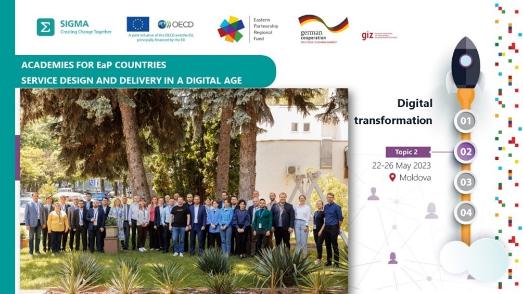SIGMA › Events › Service Design and Delivery in a Digital Age - Academies for EaP countries - Topic 2
Service Design and Delivery in a Digital Age - Academies for EaP countries - Topic 2
|
The SIGMA Programme and GiZ, in the framework of the Eastern Partnership Regional Fund for Public Administration Reforms are co-organising a series of academies on service design and delivery in a digital age. This series of events aims at strengthening the foundations for improved public governance and public administration capacities by fostering exchange and synergies (at the national, regional and EU level). |
|
|
A first academy dedicated to user-centric design and delivery of public services was organised in Paris (6-10 February 2023) and focused on the importance of good administration and the inclusion of principles in legislation (law or administrative code), administrative simplification and burden reduction, data-protection, human-centric design thinking and delivery. The second academy focused on ‘digital transformation’. |
 |
|
|
|
|
As part of the collaboration between SIGMA and the GiZ Regional Fund for the Eastern Partnership, 26 senior civil servants from the 5 Eastern Partnership countries participated in the second academy held in Chisinau on 22-26 May 2023. The programme unfolded around 14 modules over 5 days. |
|
Day 1: Digital government transformation Foundations & principlesDuring day 1, Taavi Linnamae and Siim Sikkut presented the foundations of a digital society including policy shaping and enhanced public sector innovation. After presenting the lessons learnt, milestones and pillars from the Estonian case study, the participating countries presented challenges and latest developments in the area of digital transformation. All of the ENP East countries have been actively engaged in improving service delivery for citizens and businesses for some time as documented in the SIGMA Paper published at the end of 2022. |
||
During the academy the countries presented some
|
|
|
|
Read all the presentations |
||
Day 2: Governance & roadmappingDay 2, started with discussing the issues of governance and building a sustainable digital roadmap. Effective roadmaps should be:
|
Read all the presentations |
|
Day 3: InteroperabilityDay 3 focused on interoperability by presenting the Estonian X-road. In the afternoon, the European Commission – DGDIGIT (Andrea Halmos, Deputy Head of the interoperability unit, Claudia Oliveira and Stefanos Kotoglou, programme managers) presented the Interoperability framework, interoperability assessment tools for digital public services and the Interoperable Europe Act. |
Read all the presentations |
|
Day 4: Topic e-ID and (mutual) recognition of e-signatures and trust services)Day 4 spotlighted the topic of e-ID and (mutual) recognition of e-signatures and trust services. Laura Kask introduced the participants to the legal, technical and governance aspects. Vicente Andreu Navarro, Policy Officer, DG CONNECT , shared the latest developments on the eIDAS2.0. Katarzyna Ziółkowska, from the Ministry of Digital Affairs in Poland presented the Polish case on the eWallet. |
Read all the presentations |
|
Day 5: Preparing public administrations and societies for the (digital) future!The final day was dedicated to a visit to Tekwill in Moldova (the tech incubator) and included a panel related to women/girls in tech, with Moldovan representatives, Aiva Staņēviča, board member from Riga TechGirls and Carmen Cabanillas, Deputy General in the Directorate General of Public Governance in the Ministry of Finance and Public Administration, Spain. A presentation from Collin van Noordt on Opportunities and challenges of implementing AI in Government concluded the week. |
Read all the presentations |
|
|
|
||
Related Documents
.jpg)






